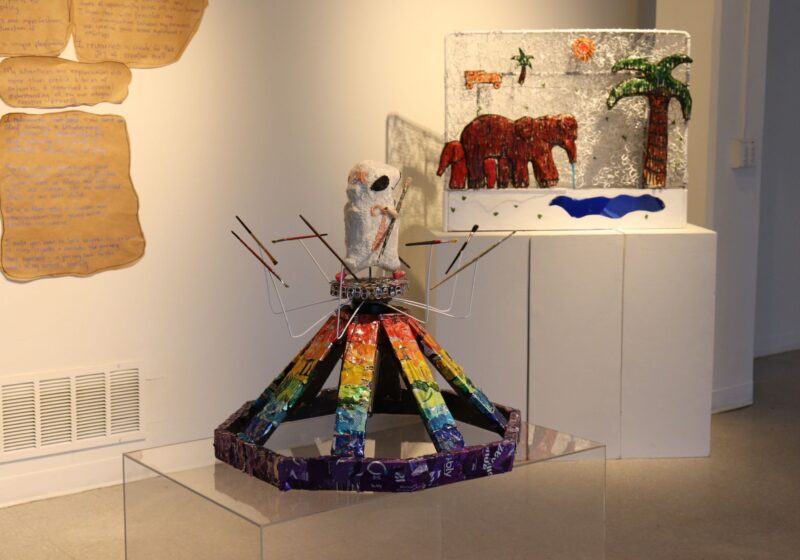Bringing to light new questions about its Constitution and Bylaws, Students’ Association (SA) Senate voted unofficially on Monday, Sept. 14, to fill a vacant seat via a selection committee, in a move that could prompt an appeal to the All-Campus Judicial Council (ACJC).
The seat was held in May by senior Melissa Holloway, who had been elected simultaneously as a senator and as SA Vice President. She resigned the Senate seat to ascend to the vice presidency. In informal proceedings that same month, Senate chose to establish a selection committee to appoint a new senator. Following concerns about the plan, however, Senate decided to hold off on concrete action until the fall.
“Unfortunately, this decision, though well intended, raised some constitutional concerns,” ACJC Chief Justice and senior Wesline Manuelpillai explained in an email interview. “Is it constitutional to select an elected position? By implementing a selection committee, are we violating the rights of students to elect their representatives? What about the other eligible candidates, all sophomores, who were passed up for the opportunity to serve?”
According to Holloway, SA leaders again challenged the constitutionality of the plan during discussions prior to the Senate meeting held Sept. 14.
An apparent discrepancy between the SA Constitution, which was last updated in 2005, and the SA Bylaws, which were revised last semester, contributed
to the debate. Several SA government officials, including Manuelpillai and Speaker of the Senate Ethan Bidna, indicated that they believe the Constitution is outdated.
While the Constitution dictates that all senators shall be elected by the student body, the new bylaws stipulate that three senators from each upperclassman year shall be elected in the spring semester. Holloway was one of only three students from the class of 2016 to run in the spring elections.
The Bylaws also state that if there is a Senate vacancy, the next eligible candidate will automatically fill the role. ‘Eligible candidate’ is defined in the Bylaws as “any official or write-in candidate who received at least 50 votes.” Manuelpillai confirmed that the next eligible candidate was
“the person next in line for the seat who received a minimum of 50 votes.”
In one interpretation of this clause, which was discussed in multiple interviews with SA leaders, the next eligible candidate would be the next highest vote-getter overall, who in this case is sophomore Anmol Almast. In another interpretation—the one used by the senators in May—the “next eligible candidate” is taken to mean the next highest vote-getting member of the senior class. This interpretation stems from the three-senator-per-class requirement. The Bylaws provide, as well, that Senate may form a selection committee if no eligible candidates exist.
Not only did senators find that the requirements of the Bylaws had not been met, they also feared that the senior class would not be properly represented with only two voices.
In an attempt to remedy the plan put forth by Senate in May, Manuelpillai and Senate Elections & Rules Committee Chair and junior Paul Jaquish drafted a list of viable options Senate could take to fill the vacancy. Manuelpillai expressed the difficulty of this task, considering the contradictions between the Constitution and the new bylaws as well as the degree of interpretations that could arise.
Last Monday, Senate reviewed and discussed this list, and “during a motion to discuss, indicated [it] wished to continue with the directive outlined by the Bylaws,” Bidna said. “This decision was represented during an unofficial vote—given that I, as Speaker, do not need the consent of the Senate to follow the Bylaws.” The list was not made available to the Campus Times.
According to both Binda and Manuelpillai, Senate’s course of action is not without precedent, although Manuelpillai noted that “this is usually done only in cases where there are no eligible candidates.” Further questioning the details of Senate’s course of action, she said that “there is no technical deficiency. The Senate has filled its quota at large. However, the Bylaws do indicate that three senior senators must serve at the start of each term. Which, Melissa fulfilled, if only for 10 minutes.”
Manuelpillai went on to say that all the options available to Senate were “constitutionally murky.”
“[But] based on the way the Senate chose to interpret the Constitution,” she continued, “none of the options were outright nonadherent to the Bylaws, and the option chosen was not outright unconstitutional.” The only option that would have adhered to both the Constitution and the Bylaws would have been to leave the Senate seat vacant. “Paul and I proposed this option to the Senate,” Manuelpillai added.
When asked why she thought Senate opted against leaving her former seat vacant until a constitutional revision, Holloway said she understood the decision. She explained that such a change would require months of effort and a tremendous turnout of student support—no easy feat. She expressed agreement with Manuelpillai and Bidna that the Constitution needs to be updated.
Bidna said in an email that the situation featured “the best proposals that balanced our adherence to the rules handed down to us by the student body and our desire to choose an option that best served the interests of students.” He added that no member of student government had approached him with concerns. Bidna, echoing comments from Manuelpillai and Holloway, highlighted the cooperation between branches of the SA government in reaching Senate’s decision. “…The term ‘dispute’ would be incorrect—all parties were on board and involved.”
Holloway said she sees both sides of the situation and acknowledged the validity of both Senate’s choices and ACJC’s concerns. “I see the value in it,” she said of the selection committee. “I just wish there was a way to make the process more democratic.” Despite this, she has no worries about Senate’s outlook.
Bidna and Manuelpillai both described plans among SA leaders to reconcile the Constitution and the updated bylaws by revising the Constitution. “This is part of our larger effort to put students at the center of our decision-making and advocacy efforts,” Bidna explained. Manuelpillai estimated a completion date of spring 2016.
The next overall highest vote-getter in the spring Senate elections, Almast, who lost by 10 votes, issued a statement to the Campus Times on Tuesday expressing her unhappiness not only with the outcome of the election, but with Senate’s decision as well.
“Since I was the runner up, it seemed logical that I would be selected as ‘the next eligible candidate,’” she said. “I think it is wrong and unfair of them to [form a selection committee]. It violates the student body’s rights to elect their own representatives. The Senate isn’t just allowed to pick someone to be a member. It’s a violation of the Constitution.”
Looking to the near future, Manuelpillai explained that “ACJC has room to take action and remedy the situation. But only if a student from the student body chose to appeal to ACJC because they felt that the decision the Senate reached was unfair.”
An appeal would lead to an ACJC review, she said, in which the court would examine Senate’s decision and lend its own interpretation of the Constitution, which would be the final word on the matter.
Trombly is a member of the class of 2018.




